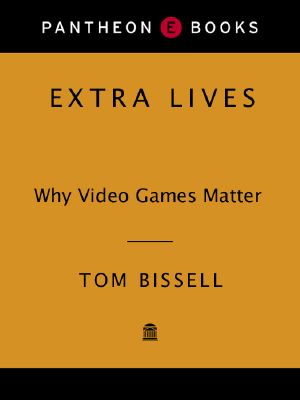Extra Lives

- Authors
- Bissell, Tom
- Publisher
- Vintage
- ISBN
- 9780307379283
- Date
- 2010-06-03T00:00:00+00:00
- Size
- 2.34 MB
- Lang
- en
Tom Bissell is a prizewinning writer who published three widely acclaimed books before the age of thirty-four. He is also an obsessive gamer who has spent untold hours in front of his various video game consoles, playing titles such as *Far Cry 2, Left 4 Dead, BioShock, *and* Oblivion* for, literally, days. If you are reading this flap copy, the same thing can probably be said of you, or of someone you know.
Until recently, Bissell was somewhat reluctant to admit to his passion for games. In this, he is not alone. Millions of adults spend hours every week playing video games, and the industry itself now reliably outearns Hollywood. But the wider culture seems to regard video games as, at best, well designed if mindless entertainment.
*Extra Lives* is an impassioned defense of this assailed and misunderstood art form. Bissell argues that we are in a golden age of gaming—but he also believes games could be even better. He offers a fascinating and often hilarious critique of the ways video games dazzle and, just as often, frustrate. Along the way, we get firsthand portraits of some of the best minds (Jonathan Blow, Clint Hocking, Cliff Bleszinski, Peter Molyneux) at work in video game design today, as well as a shattering and deeply moving final chapter that describes, in searing detail, Bissell’s descent into the world of *Grand Theft Auto IV*, a game whose themes mirror his own increasingly self-destructive compulsions.
Blending memoir, criticism, and first-rate reportage, *Extra Lives* is like no other book on the subject ever published. Whether you love video games, loathe video games, or are merely curious about why they are becoming the dominant popular art form of our time, *Extra Lives* is required reading.
*From the Hardcover edition.*
**
### From Publishers Weekly
Starred Review. Grand Theft Auto IV is both a waste of time and the most colossal creative achievement of the last 25 years, according to this scintillating meditation on the promise and discontents of video games. Journalist Bissell (*Chasing the Sea*) should know; the ultraviolent car-chase-and-hookers game was his constant pastime during a months-long intercontinental cocaine binge. He's ashamed of his video habit, but also ashamed of being ashamed of the dominant art form of our time; by turning the eye of a literary critic on the gory, seemingly puerile genre of ultraviolent, open-ended shooter games, he finds unexpected riches. Bissell bemoans the uncompromising stupidity of their story lines, wafer-thin characters, and the moronic dialogue, but celebrates the button-pushing, mesmeric qualities and the subtle, profound depths these conceal—the catharses of teamwork and heroism in the zombie-fest Left for Dead, the squirmy moral dilemmas of Mass Effect, the mood of wistful savagery suffusing the rifles-and-chainsaws-bedecked denizens of Gears of War. Bissell excels both at intellectual commentary and evocative reportage on the experience of playing games, while serving up engrossing mise-en-scène narratives of the mayhem. If anyone can bridge the aesthetic chasm between readers and gamers, he can. *(June 8)*
Copyright © Reed Business Information, a division of Reed Elsevier Inc. All rights reserved.
### From Booklist
Might as well get this out of the way: Bissell is addicted to video games. So much so that he pretty much missed the last presidential election because he was playing a new and highly anticipated game. Here he explores not just his own affection for video games but also the games themselves. What separates good games from bad? Where do video games fit on the sliding scale of art? A video game, Bissell tells us, is a form a self-surrender, but a different form than, say, a movie. We have no influence over what happens in a movie, but we do in a video game. In playing a video game, we are, in a sense, the authors of the stories we’re acting out. Bissell explores the key elements of video games: dialogue, character design, voice performance, visual appearance. Do the best games approach something akin to virtual (or perhaps alternate) reality? Not just for gamers, the book should also appeal to readers who have some serious questions about the nature and impact of video games and their increasing popularity. --David Pitt